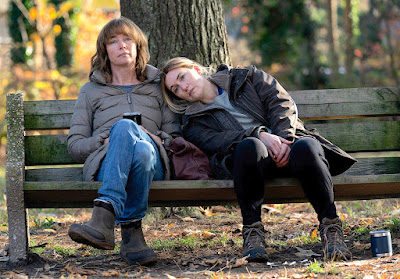SPOILERS THROUGHOUT For a lover of puns, Mare of Easttown provides: say the title out loud and the title character becomes the "mayor"—which is a stretch, but if we consider the French pronunciation (mère = mother), it all makes sense: Mare is Easttown's unofficial mother: she grudgingly but dutifully goes to their homes in response to issues minor and major (remember in Episode One she tells a community member that she's a detective and shouldn't call her for such small things); she is a maternal figure to her grandson; however, she cannot mother her own children due to feelings of guilt: her son committed suicide and her daughter found his body in response to Mare asking her to check up on him.
Indeed, we could add an "s" to the title (Mares [Mères] of Easttown), for this is a story of mothers and both the potential and limits of their love for their children. Erin carefully squirrels away money—even considering selling her body—to afford ear tubes for her son; Carrie, whose story is bookended by leaving and reentering treatment, wants the legal right to parent her son; Dawn considers stealing from her employer to pay ransom for her kidnapped daughter (but she won't break her best friend's heart by identifying her brother as the hoax-kidnapper); Helen, a crusty soul who fought her way through her marriage, banters and battles with Mare; Lor agrees to mother the child her husband fathered during an affair, and Lor and Mare come to the worst types of knowledge for a mother: that one's son has killed; that the other's son has killed himself.
I used to watch shows like Law and Order in graduate school, but once I had children, I stopped: as a mother I couldn't bear seeing children suffer as "entertainment." I feel the same way about using kidnapped or killed women as plot devices; even though I smirked along with SNL's "murdur durdur" skit, I remembered that a (fictional) young woman had been killed for this spoof to exist. Still, the show drew me into theorizing: Mare's daughter? Guy Pearce (who does not seem to have a character name, according to Twitter)? Mare herself in a blackout night-mare-ish turn of events?
Maybe this is a humblebrag, but I did identify Ryan as the killer (didn't see Mr. Carroll's gun coming at all; thought it was Mare's father's), and while that ID was OK theoretically, seeing Ryan run home and tell his mother that Mare knew was one of the most terrible moments I've even seen on screen because it was so real, so not played for drama. And Mare's face when she realizes that Ryan killed Erin, when the knowledge comes into her ken, to borrow from Henry James, is another terrible moment because she knows that she has not solved a crime; she has broken a mother, her best friend Lor.
The penultimate scene, with Mare holding Lor in a twisted pietà tableau—Mare is no Virgin Mary; Lor is no Christ figure, though she did accuse Mare (a Judas figure?) of betraying her—shows motherhood at its perhaps most complex: Mare cannot release herself from guilt over her son's suicide; she can comfort Lor, whose son she has had arrested for killing the mother of the baby Lor has agreed to mother. That scene, even more than the final one, sticks with me.

No comments:
Post a Comment